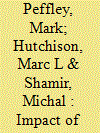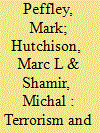| Srl | Item |
| 1 |
ID:
143148


|
|
|
|
|
| Summary/Abstract |
How do persistent terrorist attacks influence political tolerance, a willingness to extend basic liberties to one's enemies? Studies in the U.S. and elsewhere have produced a number of valuable insights into how citizens respond to singular, massive attacks like 9/11. But they are less useful for evaluating how chronic and persistent terrorist attacks erode support for democratic values over the long haul. Our study focuses on political tolerance levels in Israel across a turbulent 30-year period, from 1980 to 2011, which allows us to distinguish the short-term impact of hundreds of terrorist attacks from the long-term influence of democratic longevity on political tolerance. We find that the corrosive influence of terrorism on political tolerance is much more powerful among Israelis who identify with the Right, who have also become much more sensitive to terrorism over time. We discuss the implications of our findings for other democracies under threat from terrorism.
|
|
|
|
|
|
|
|
|
|
|
|
|
|
|
|
| 2 |
ID:
186809


|
|
|
|
|
| Summary/Abstract |
How does terrorism influence citizens’ willingness to deny basic liberties to domestic groups alleged to be “fellow travelers” of the perpetrators of terrorism? Based on intergroup threat theory and social identity theory, we hypothesize that political intolerance toward fellow traveler groups is determined by three factors: (1) the level of terrorism, (2) the degree to which domestic outgroups are alleged to be demographically or politically associated with terrorist groups, and (3) whether individuals identify strongly with the political Right. Consistent with our hypotheses, we find that higher levels of terrorism in Israel over a thirty-year period produce a “diffusion of political intolerance” among Israeli Jews on the Right that extends to domestic groups distant from the perpetrators of terrorism. Our findings have important implications for the study of terrorism, democracy, and political tolerance.
|
|
|
|
|
|
|
|
|
|
|
|
|
|
|
|